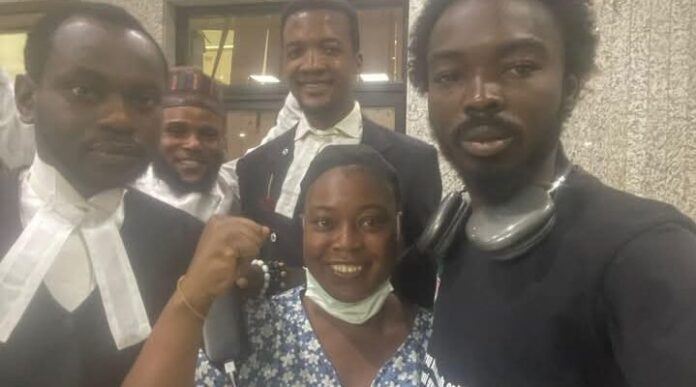A Federal High Court in Abuja has granted bail to Olamide Thomas, a woman accused of making death threats against Seyi Tinubu, son of Nigeria’s President, and other top police officials through viral social media videos. Justice Emeka Nwite set the bail at ₦10 million, accompanied by strict conditions.
Thomas, who has been in custody at the Suleja Correctional Centre since her arraignment on December 20, 2024, pleaded not guilty to the three-count charge brought against her by the police. The charges, which fall under Nigeria’s Cybercrimes Act, 2024, accuse her of intentionally transmitting threatening messages online.
Bail Decision and Conditions
Justice Nwite, in his ruling, explained that the prosecution failed to provide compelling evidence to suggest that Thomas would evade trial. “I have carefully examined the affidavit evidence of both the defendant and the complainant,” the judge noted, adding that granting bail is in the interest of justice provided the accused does not obstruct or interfere with the trial.
The court stipulated that Thomas provide one surety who must present a three-year tax clearance certificate and reside within the jurisdiction of the court. The surety is also required to depose an affidavit of means, submit passport photographs, and undergo a residential address verification.
The trial has been scheduled to commence on February 18, 2025.
Details of the Allegations
Thomas’s ordeal stems from accusations of making inflammatory statements in Yoruba through social media videos. In these messages, she allegedly targeted Seyi Tinubu, the Inspector General of Police (IGP) Kayode Egbetokun, and Police Public Relations Officer (PPRO) Muyiwa Adejobi.
One of the charges alleges that she predicted death for Seyi Tinubu and stated that misfortune would plague the Tinubu family. This act, the police argue, was intended to instill fear of harm and constitutes a violation of Section 24 (2)(a) of the Cybercrimes Act.
Thomas is also accused of threatening IGP Egbetokun, stating that he would face violence, and of making harrowing predictions about Adejobi’s family, claiming he would lose his children. Prosecutors argue that these threats placed the alleged victims in genuine fear for their lives and well-being.
Legal Context and Public Reactions
The case has sparked debates about free speech, online behavior, and the appropriate use of the Cybercrimes Act to address digital harassment. Legal analysts have emphasized that while freedom of expression is guaranteed under the Nigerian Constitution, such rights are subject to limitations when they infringe on the rights or safety of others.
The Cybercrimes (Prohibition, Prevention, Etc.) Act was enacted to curb misuse of electronic communications. Under Section 24 (2)(a), transmitting information that induces fear or threatens harm is a criminal offense punishable by law. The act has been lauded for addressing cybercrime but criticized for its potential misuse in cases involving politically or socially sensitive individuals.
A legal practitioner, speaking under anonymity, noted that the strict bail conditions reflect the severity of the allegations. “Cases like these test the balance between ensuring public safety and preserving individual freedoms,” he remarked.
Background on the Accused
Thomas, who has yet to issue a public statement, reportedly made the controversial statements during a social media broadcast earlier in 2024. Observers have questioned her motivations, with some speculating that personal grievances or socio-political frustrations may have fueled her remarks.
The controversy also brings renewed attention to high-profile figures like Seyi Tinubu, who, as the president’s son, is frequently in the public eye. Similarly, the involvement of senior police officials in the case underscores the potential risks associated with targeting public officers in an era of heightened digital engagement.
Judiciary’s Handling of the Case
Justice Nwite’s ruling has been met with mixed reactions. Supporters argue that the court upheld principles of justice by allowing bail and ensuring Thomas has an opportunity for a fair trial. Critics, however, have voiced concerns about the legal and social implications of criminalizing online speech, even when it involves aggressive or troubling rhetoric.

